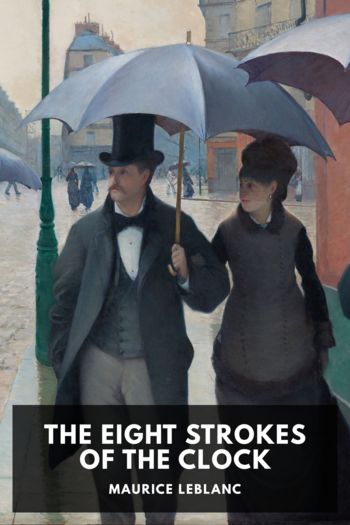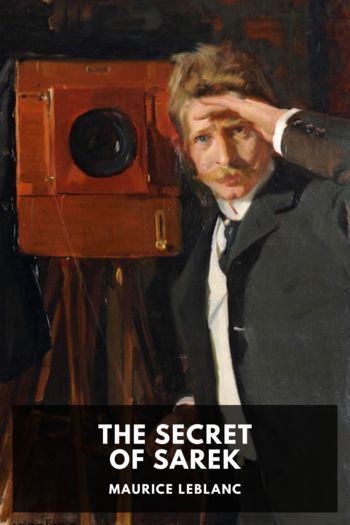The Eight Strokes of the Clock - Maurice Leblanc (reading in the dark .TXT) 📗

- Author: Maurice Leblanc
Book online «The Eight Strokes of the Clock - Maurice Leblanc (reading in the dark .TXT) 📗». Author Maurice Leblanc
Hortense stared at him in amazement. How was it that he was accepting his defeat with such a careless air and even talking in a tone of triumph, whereas really he had been soundly beaten by Pancaldi and even made to look just a trifle ridiculous?
She could not help letting him feel this; and the fashion in which she did so betrayed a certain disappointment, a certain humiliation:
“Everything is a concatenation of events: very well. But the chain is broken, because, when all is said, though you know the thief, you did not succeed in laying hands upon the stolen clasp.”
The reproach was obvious. Rénine had not accustomed her to failure. And furthermore she was irritated to see how heedlessly he was accepting a blow which, after all, entailed the ruin of any hopes that he might have entertained.
He did not reply. He had filled their two glasses with champagne and was slowly emptying his own, with his eyes fixed on the statuette of Mercury. He turned it about on its pedestal and examined it with the eye of a delighted connoisseur:
“What a beautiful thing is a harmonious line! Colour does not uplift me so much as outline, proportion, symmetry and all the wonderful properties of form. Look at this little statue. Pancaldi’s right: it’s the work of a great artist. The legs are both slender and muscular; the whole figure gives an impression of buoyancy and speed. It is very well done. There’s only one fault, a very slight one: perhaps you’ve not noticed it?”
“Yes, I have,” said Hortense. “It struck me the moment I saw the sign, outside. You mean, don’t you, a certain lack of balance? The god is leaning over too far on the leg that carries him. He looks as though he were going to pitch forward.”
“That’s very clever of you,” said Rénine. “The fault is almost imperceptible and it needs a trained eye to see it. Really, however, as a matter of logic, the weight of the body ought to have its way and, in accordance with natural laws, the little god ought to take a header.”
After a pause he continued:
“I noticed that flaw on the first day. How was it that I did not draw an inference at once? I was shocked because the artist had sinned against an aesthetic law, whereas I ought to have been shocked because he had overlooked a physical law. As though art and nature were not blended together! And as though the laws of gravity could be disturbed without some fundamental reason!”
“What do you mean?” asked Hortense, puzzled by these reflections, which seemed so far removed from their secret thoughts. “What do you mean?”
“Oh, nothing!” he said. “I am only surprised that I didn’t understand sooner why Mercury did not plump forward, as he should have done.”
“And what is the reason?”
“The reason? I imagine that Pancaldi, when pulling the statuette about to make it serve his purpose, must have disturbed its balance, but that this balance was restored by something which holds the little god back and which makes up for his really too dangerous posture.”
“Something, you say?”
“Yes, a counterweight.”
Hortense gave a start. She too was beginning to see a little light. She murmured:
“A counterweight? … Are you thinking that it might be … in the pedestal?”
“Why not?”
“Is that possible? But, if so, how did Pancaldi come to give you this statuette?”
“He never gave me this one,” Rénine declared. “I took this one myself.”
“But where? And when?”
“Just now, while you were in the drawing-room. I got out of that window, which is just over the signboard and beside the niche containing the little god. And I exchanged the two, that is to say, I took the statue which was outside and put the one which Pancaldi gave me in its place.”
“But doesn’t that one lean forward?”
“No, no more than the others do, on the shelf in his shop. But Pancaldi is not an artist. A lack of equilibrium does not impress him; he will see nothing wrong; and he will continue to think himself favoured by luck, which is another way of saying that luck will continue to favour him. Meanwhile, here’s the statuette, the one used for the sign. Am I to break the pedestal and take your clasp out of the leaden sheath, soldered to the back of the pedestal, which keeps Mercury steady?”
“No, no, there’s no need for that,” Hortense hurriedly murmured.
Rénine’s intuition, his subtlety, the skill with which he had managed the whole business: to her, for the moment, all these things remained in the background. But she suddenly remembered that the eighth adventure was completed, that Rénine had surmounted every obstacle, that the test had turned to his advantage and that the extreme limit of time fixed for the last of the adventures was not yet reached.
He had the cruelty to call attention to the fact:
“A quarter to eight,” he said.
An oppressive silence fell between them. Both felt its discomfort to such a degree that they hesitated to make the least movement. In order to break it, Rénine jested:
“That worthy M. Pancaldi, how good it was of him to tell me what I wished to know! I knew, however, that by exasperating him, I should end by picking up the missing clue in what he said. It was just as though one were to hand someone a flint and steel and suggest to him that he was to use it. In the end, the spark is obtained. In my case, what produced the spark was the unconscious but inevitable comparison which he drew between the cornelian clasp, the element of luck, and Mercury, the god of luck. That was enough. I understood that this association of ideas arose from his having actually





Comments (0)